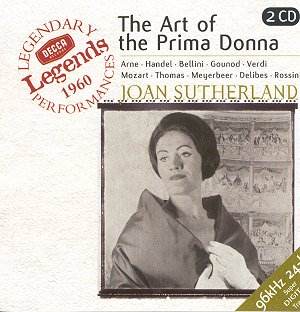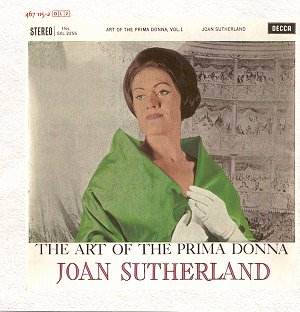THE ART OF THE PRIMA
DONNA
 Dame Joan Sutherland (soprano),
Orchestra and Chorus of the Royal Opera House, Covent Garden/Francesco
Molinari-Pradelli
Dame Joan Sutherland (soprano),
Orchestra and Chorus of the Royal Opera House, Covent Garden/Francesco
Molinari-Pradelli
 Decca Legends 467 115-2
2 CDs, 52' 38"; 55' 54"
Decca Legends 467 115-2
2 CDs, 52' 38"; 55' 54"
Crotchet
£17.00
Amazon
US $21.82 probably a saving from the
UK

Arne: Artaxerxes: The
soldier tir'd
Bellini: Norma: Sediziose voci … Casta diva … Ah! Bello
a me ritorna
I Puritani: O rendetemi la speme … Qui la
voce … Vien, diletto Son vergin vezzosa
La Sonnambula: Care compagne … Come per me sereno
… Sovra il sen
Delibes: Lakmé: Ah! Où va la jeune
Indoue
Handel: Samson: Let the bright
Seraphim
Gounod: Faust: O Dieu! Que de bijoux … Ah! Je ris de me
voir
Roméo et Juliette: Ah! Je veux
vivre
Meyerbeer: Les Huguenots: O beau pays de la
Touraine!
Mozart: Die Entführung aus dem Serail: Martern aller
Arten
Rossini: Semiramide: Bel raggio
lusinghier
Thomas: Hamlet: A vos jeux, mes
amis
Verdi: Otello: Mia madre aveva una povera ancella … Piangea
cantando
Rigoletto: Gualtier Maldè … Caro
nome
La Traviata: E' strano … Ah, fors'è lui …
Sempre libera
Begin with Son vergin vezzosa and, over a lilting accompaniment, you
will hear this incredibly beautiful voice flitting, floating and dancing
around the notes with such freedom that you want to compare it, not with
other voices, but with a violinist like Kreisler. Go to the opening of O
rendetemi la speme and you will hear that the voice has shade as well
as light, and her Otello aria is as profoundly moving as any. Yet the comparison
with a violin remains apt, for the words, if not exactly absent, are subordinated
to the musical line.
This, then, is the essence of Sutherland; a voice which manages to combine
purity with enough vibrations to fascinate the ear, complete evenness from
top to bottom, extreme agility and a notable expressive range. As an interpreter
her first interests are vocal and musical; the drama of the situation must
be portrayed through these means. This entails two features for which she
was widely criticised; her diction and her scooping.
Those who rudely said she must have had a cleft palate greatly exaggerated,
but she seems to have made a conscious decision that the words were not in
themselves a means of expression and they were not to be allowed to disturb
the stream of sound upon which her interpretation was built. As for the scooping,
I prefer to say that she floats gently from note to note, avoiding her coloratura
from sounding too geometric.
Both these characteristics have their dangers, and I am not going to say
that in the thirty-odd years of career which followed this record she never
fell into them, but here, in 1960, she was at her absolute prime and is shown
to be both unique and uniquely great. While it may be that some present-day
practitioners have found a more convincing style for Arne, Handel and Mozart,
all the rest is seamless gold, some of the most ravishing singing you will
ever hear.
To get an idea of why she was unique, compare her Lakmé aria with
the recordings by Galli-Curci and Callas. Galli-Curci (1917) is a pure canary,
her effortless agility a joy in itself but a slightly monochrome one. Go
to Sutherland and the voice has body. With Callas the voice is made a servant
of her dramatic conception. She seems harsh and effortful beside Sutherland,
but effective in her own terms.
Each item in this set was planned as a tribute to a great prima donna of
the past (profiles of them by Alan Blyth appear in the booklet) and while
this results in a slightly odd order (the Mozart between the Otello and Traviata
arias, for instance) I am glad the records have been reissued exactly as
they were. The timings, pretty generous for LPs, may seem short today, but
again, I feel Decca have made the right decision not to bring in extra material.
With full texts and translations this is a model of how a company should
present its archive material (unlike certain EMI compilations I've been reviewing
recently).
Molinari-Pradelli could be a listless conductor on occasion, but here he
contributes strongly to the success of the enterprise. Apart from a slight
woolliness in the choir (which only sings in a few items) the recordings
still sound excellent.
Chris Howell
Performance:

Recording:


